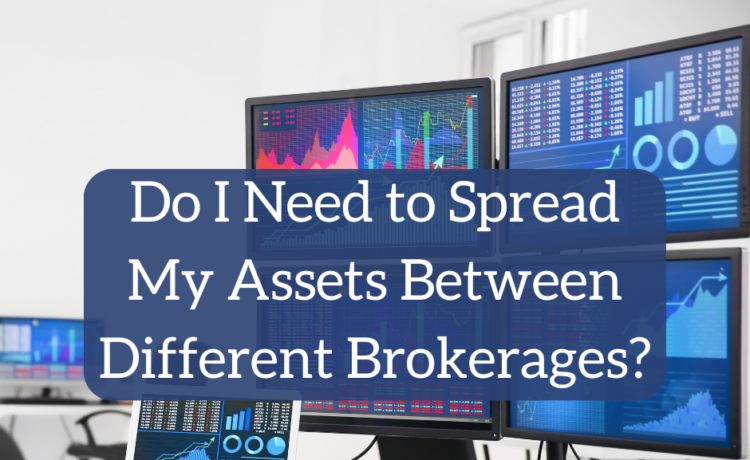 By Dr. Jim Dahle, WCI Founder
By Dr. Jim Dahle, WCI Founder
I often get questions from white coat investors such as:
- Do I need to have more than one brokerage account?
- Is it OK to have all of my assets at Vanguard?
- How much is too much to have in a brokerage account?
- Do I need diversification between investing companies?
They’re all really asking the same thing: do you need to spread your money around between various investing companies in case something happens to one of them? Like most questions in investing, the answer is: “It depends.”
FDIC Insurance and Banks
If you’ve got a lot of money sitting in bank accounts, the answer to this question is probably yes. FDIC insurance is generally $250,000 per account, so if you have more than that in cash, you actually may need to have your money at more than one institution. Note that there are ways to structure accounts so that you can have more insured funds than $250,000 at a single bank. Remember, however, that banks have a very significant difference from a brokerage account. Banks engage in fractional banking. If 100 people put $100 a piece into a brokerage account, there is now $10,000 worth of cash and securities in that brokerage account. The securities can fall in value, but they don’t really disappear.
That’s not the case at a bank. The bank takes that $10,000 and then loans out $40,000. There might only be $5,000 at the bank even though $10,000 was put in there. If all 100 people wanted their money back at the same time, the bank would fail. This is why FDIC insurance is so important. It protects you from when the bank doesn’t have the money.
SIPC Insurance
Brokerages do have a kind of insurance too, but it functions somewhat differently from FDIC insurance. SIPC insurance protects you in the event of a brokerage failure but not from the value of your investments going down. It’s really just a line of credit from the Treasury that allows you to get some of your money right away until everything can get sorted out at the failed brokerage. SIPC insurance is one of the reasons why it may be just fine to have all your money at Vanguard (or Fidelity or Schwab). You’ll have access right away to some of it via the SIPC.
More information here:
Vanguard, Fidelity, and Schwab Are Too Big to Fail
Another benefit of investing with Vanguard, Fidelity, and Schwab is that they’re frankly “too big to fail.” Vanguard has $7.7 trillion in AUM. That’s like two years of US government tax revenue. It’s too big to fail. Now, if you’re investing with some tiny little startup brokerage firm, maybe you do need to worry. But Fidelity or Schwab? Nah.
Diversify Investments, Not Custodians
Investors learn quickly the importance of diversifying their investments. It would be a major error to put all your money into a single stock, so you use mutual funds—or, more likely, multiple mutual funds. Perhaps you assume that if diversifying your investments is smart, it must be smart to diversify where your investments are held. It’s really two very different things, though. The first matters a lot. The second matters much less and perhaps not at all. Even if Fidelity goes out of business, your money is not invested in Fidelity. It just sits there on the Fidelity computers, and it can easily be moved elsewhere, even if the company goes bankrupt.
More information here:
Will I Be Protected If My Investment Broker Goes Bankrupt?
When You Should Diversify Custodians
All the discussion above, of course, applies to publicly traded securities and big brokerage firms. Once you cross into private investments, you end up in situations where the custodian is also the investment. This is why Bernie Madoff could pull off his fraud, because he was the custodian and the investment. It’s similar if you’re invested in a real estate syndication. There is a certain amount of manager risk there. The manager might be a fraudster or just incompetent.
In that sort of situation, diversification matters a lot. If you’re going to invest in private investments, it better either be with an enterprise where you’ve had dinner with every important member of that company (and preferably are involved in day-to-day management) or you had better invest with multiple companies.
More information here:
Financial Gurus Who Have Gone Broke
Investment Company Diversification Happens Naturally

This isn’t an issue for most people, just because they naturally have their money spread around with multiple custodians. Consider our situation:
- Vanguard: Trust taxable account, personal taxable account, UGMAs, Roth IRAs
- Fidelity: 401(k)s and HSA
- Schwab: 401(k) and Cash Balance Plan
- TSP: old 401(k)
- My529: 529s
- TreasuryDirect: Trust and personal taxable accounts
And that doesn’t include the 15% of the portfolio invested in private investments, which is spread among a dozen more companies. While this may be a bit of an extreme example, I would bet that most mid-career white coat investors already have their money invested with more than one brokerage company.
I wouldn’t lose sleep if all of my money were invested in mutual funds or ETFs held with one brokerage company, but it’s not that much hassle to spread it between two if it makes you feel better.
What do you think? Is it OK to have all of your money at just one company? Why or why not? How many companies do you invest with? Comment below!



















